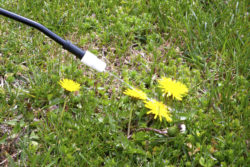 An Arizona man recently filed a lawsuit against agriculture corporation Monsanto, alleging his exposure to the weedkiller Roundup led to his diagnosis with chronic lymphocytic leukemia.
An Arizona man recently filed a lawsuit against agriculture corporation Monsanto, alleging his exposure to the weedkiller Roundup led to his diagnosis with chronic lymphocytic leukemia.
The plaintiff, Albert P., says he used Monsanto’s Roundup product for decades, from around 1993 through 2017, when he was diagnosed with chronic lymphocytic leukemia. He alleges that his Roundup usage directly led to his chronic lymphocytic leukemia diagnosis, and has turned to litigation in response.
Albert claims that he was not adequately warned about the risk of Roundup cancer, including chronic lymphocytic leukemia, and alleges that even though he followed the safety warnings on the product, this was not enough to prevent his cancer diagnosis.
Albert claims that his Roundup chronic lymphocytic leukemia could have been prevented if he had been adequately warned of the serious risks of the carcinogenic product.
Albert filed his lawsuit on multiple counts, including design defect, failure to warn, negligence, breach of express and implied warranties, and others. The lawsuit was filed on June 1, 2018, in the U.S. District Court for the District of Arizona.
Albert’s lawsuit, along with countless others like it, alleges that Monsanto has misrepresented the use of Roundup as safe, despite knowing of the risk of cancer from Roundup use, including his chronic lymphocytic leukemia
Monsanto has gone so far as to use the taglines “safer than table salt” and “practically non-toxic” to animals to describe its product, despite allegedly being aware that the risk is much greater. Back in 1996, the New York Attorney General filed a lawsuit against Monsanto for making these kinds of statements, claiming they were deceptive and dangerous to customers, misleading them about the actual safety of the product.
Background of Roundup Cancer
Monsanto’s popular weedkiller Roundup has been linked with a number of types of Roundup cancer, including B-cell lymphoma, a type of non-Hodgkin’s lymphoma (NHL).
Farm workers and home gardeners are among the most at risk of any Roundup side effects, given the common use of the product in these roles. A number of farm workers and home gardeners have filed lawsuits against Monsanto with allegations of Roundup cancer, claiming that they were diagnosed with one of several kinds of cancer after using Roundup.
The Environmental Protection Agency began to suspect a Roundup cancer connection since the 1980s. A report published in March 2015 by the International Agency for Research on Cancer (IARC), concluding that glyphosate is linked with cancer. Glyphosate is known as the active ingredient in Roundup.
Cancer from Roundup Use
Types of cancer that have so far been linked with the weedkiller include the following:
- Non-Hodgkin’s lymphoma
- Leukemia
- Multiple Myeloma
- B-cell Lymphoma
- Bone Cancer
- Renal Cell Carcinoma (kidney cancer)
- Other Cancers
Filing a Lawsuit Over Cancer from Roundup
If you or someone you love has been diagnosed with cancer from Roundup use, you may be able to file a Roundup lawsuit. While filing a lawsuit cannot take away the pain and suffering caused by cancer from Roundup or bring a loved one back to life, it can help to alleviate the financial burden caused by medical expenses and lost wages.
The Chronic Lymphocytic Leukemia Lawsuit is Case No. 2:18-cv-01675-JZB, in the U.S. District Court for the District of Arizona.
If you or a loved one developed cancer after using Roundup as a farm worker or home gardener, you may have a legal claim. Legal migrant farm workers may also seek help. Learn more by filling out the form on this page for a FREE case evaluation.
ATTORNEY ADVERTISING
Top Class Actions is a Proud Member of the American Bar Association
LEGAL INFORMATION IS NOT LEGAL ADVICE
Top Class Actions Legal Statement
©2008 – 2026 Top Class Actions® LLC
Various Trademarks held by their respective owners
This website is not intended for viewing or usage by European Union citizens.
Get Help – It’s Free
Join a Free Roundup Cancer Class Action Lawsuit Investigation
For the most up-to-date information on this case, click here.













One thought on Man Alleges Chronic Lymphocytic Leukemia Caused by Roundup Exposure